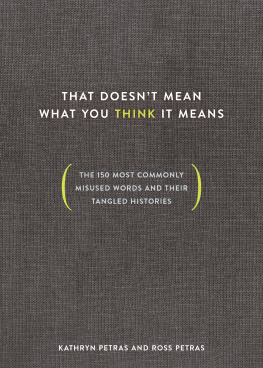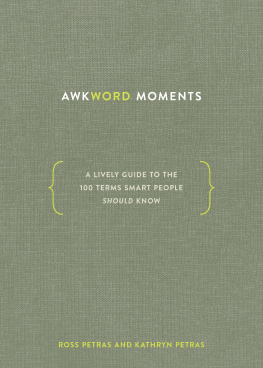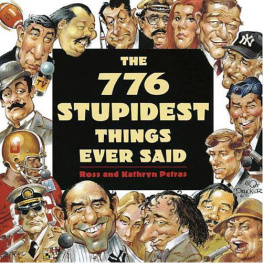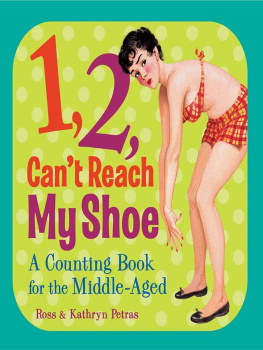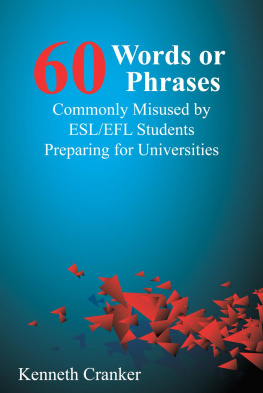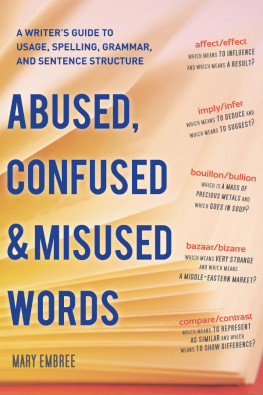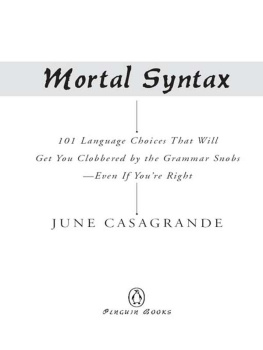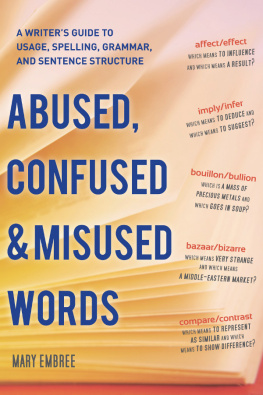Thanks as always to our extraordinary editor Lisa Westmoreland (TG!), amazing agent Andrea Somberg, dauntless designer Chloe Rawlins, peerless production manager Dan Myers, perspicacious proofreader Jennifer McClain, marvelous and pioneering marketing and publicity team David Hawk and Windy Dorresteyn, and the rest of the terrific Ten Speed Press staff.
Ross and Kathryn Petras are a brother-and-sister writing-editing team, with more than 5.2 million copies of their work in print, including titles such as Youre Saying It Wrong , Very Bad Poetry , Wretched Writing , Age Doesnt Matter Unless Youre a Cheese, and annual calendars The 365 Stupidest Things Ever Said and The 365 Smartest Things Ever Said! Ross collects (and sells) rare books (chiefly, early printed books in Latin and Greek). He reads, writes, or speakswith (very varying) degrees of proficiencyLatin, Greek, Arabic, and French. He loves reading and watching vintage sci-fi and 1930s romantic comedies. Kathy is a noir-film and pulp-novel fiend, a bad-joke aficionado, does computer-generated graphic art, and is proud to say she was on Jeopardy! (but, sadly, came in thirdand won only a designer watch). Both are word nuts, quote connoisseurs, and (they must admit) sometimes annoying grammar pedants.
a priori
Setting an a priori date for the event, however, would be dangerous.
UNITED NATIONS PRESS RELEASE
The United Nations has fallen into a common trapand you Kant really blame them. Ever read philosopher Immanuel Kant and his Critique of Pure Reason ? We havent either, and thus begins most of the confusion with a priori for nonphilosophers.
It seems like everyone except for a few Kantians thinks that a priori is a fancy way of saying prior or beforehand, as in the example above. It isnt. Yes, a priori in the original Latin means from the former or in advance. But thanks to Kant and other philosophers, it now means something more specific and confusing in English and other modern languages.
Loosely speaking, a priori means knowledge or things that we already know, not based on experiment, but deduced from axioms, i.e., knowledge that is accepted or established. In other words, you can have a priori knowledge of mathematical notions like 2+2=4 (Socrates had a famous demonstration of this when he showed how an illiterate slave implicitly understood geometry), but you cant have a priori knowledge of the results of a football game because you dont know which team will score and how often. (And just to be technical, Kant says that our knowledge of mathematics is both a priori and synthetic. But lets not go there.) On the other hand, a posteriori , which also comes from Latin, means what comes after and is used in philosophy to mean reasoning from known facts, experiments, or experience. Our advice: unless youre a philosopher, dont use either.
a priori (adj): based on axiomatic reasoning and deduction
abjure / adjure
[Joanne] Stepaniak offers a code of vegan ethics: (1) Vegans are sensitive to issues of suffering, (2) vegans value awareness of all life forms, (3) vegans adjure violence, and (4) vegans expand the principle of harmlessness.
THE RHETORIC OF FOOD
Violent vegans?
Adjure means to require, often under oath, to earnestly urge. So vegans adjuring violence means theyre getting their pitchforks ready and sharpened for an attack.
Doubtful, whatever you may think of veganism. The authors (we hope) meant abjure , which means to solemnly reject or renounce. So vegans are not on the rampage, but instead are rejecting violence.
Its an important distinction, of course. The difference between abjure and adjure is simpleits all a matter of going toward or going away from. (Both words are from Latin, as are 28.34 percent of all English words, according to a survey by the compilers of the Shorter Oxford Dictionary . Hows that for specificity!) The jure part of both words is from jurare (to swear an oath). The big question is, are you going away from the oath or moving toward making it? Ab- in Latin is a prefix meaning away, so ab jure is walking away from swearing an oath, renouncing a solemn promise, or rejecting something. Ad- in Latin is a prefix meaning to, so ad jure means to require, urge, or command, as in requiring someone to adhere to the oath he or she made.
Confusing abjure and adjure is easy. Thats probably why both words so often appear on the SATs, GMATs, and other standardized tests. And, except for students of Latin, its also easy to forget the difference once those horrible days of test taking are happily in the past. But its just a matter of ad- (to) and ab- (away).
abjure (v): to renounce solemnly
adjure (v): to earnestly request someone to do something
abrogate / arrogate
The state has effectuated a coup, as it now has abrogated to itself the authority once belonging to the Church universal.
AMERICAN THINKER
The American Thinker should have done some more thinking. Instead of abrogated , the Thinker should have used arrogated . Confusing these words is easy even for self-styled (lowercase) thinkers like us.
Abrogate basically means to abolish or repeal a law. Its a giving away word. The American Thinker was talking about the state taking up as in arrogate , meaning to claim something, usually without justification, as in this quote about the government grabbing authority that once belonged to the Church. (People have been complaining about this sort of thing for generations, like this from 1627: King Henry the VIIIpurposedto arrogate vnto himselfe the title of head of the Church of England. Notice they (correctly) used arrogate . Then again, power-hungry Henry VIII would never have abrogated any of his legal authority ever.)
Both words came from Latin into English, and the big difference between the two comes from those old Latin prefixes that we mentioned earlier: ab - and ad - (the d got melded into the r in arrogate ). Arrogate s ad - means to or toward, and - rogate comes from rogare (to ask), so it means moving to ask, or claiming something, as with King Henry or the state grabbing authority. The ab - in abrogate means away, and - rogate here means to propose a law. So abrogate means moving away from the law, or abolishing it. Similar ab - (away) words are abnegate , to renounce or reject something desirable, and abdicate , to give up power, something many English people wanted Henry VIII to do after all of his annoying arrogating.
abrogate (v): to abolish or repeal a law, evade responsibility
arrogate (v): to claim something, usually without justification
adverse / averse
Cat Has an Averse Reaction to Liquid in Commercial Food
HEADLINE, WASHINGTON POST
And were having an adverse reaction to that WaPo headlinewhich is missing a crucial d . Theres no such thing as an averse reactionor, for that matter, averse weather, averse effects, or averse events, all of which weve recently seen in print.
So whats the big diff between them? Usually, a person is averse about something (were averse to giving advice), whereas a thing is adverse . And usually, if it comes right before a noun, it should be adverse and not averse . The opposite holds as well: averse often comes after the noun, as in People of retirement age are risk aversethey turn away from risk.
That said, people have been confusing averse and adverse for years, and we can blame it all on the Romans. It (probably) began with one Latin word, vertere (to turn). The Romans tacked those pesky prefixes ad - and ab - (here we go again) onto vertere to mean two different things. The ad - version spawned advertere , to turn toward, which evolved into adverse , turning toward an enemy or a problem. The ab - version meant turning away. Over time the b was dropped, so the word became avertere , aversus , and, finally, averse .

